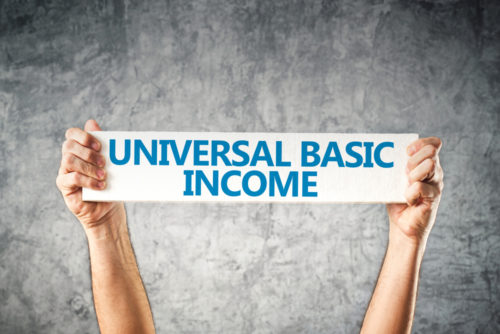In late 2019, democratic presidential candidate Andrew Yang made waves by heavily associating his campaign with the idea of universal basic income (UBI). Yang’s popular proposition pushed the idea of UBI into the national spotlight and led many to question what this seemingly utopian concept would look like if it were to be implemented in the United States.
Table of Contents
What Is Universal Basic Income?
UBI Definition
Universal basic income is financial aid provided by the government for the citizens of a geographic area. The basic tenets of true UBI consist of the following:
- It must be provided for all members of a society.
- It must be enough to cover all basic living requirements and needs.
- It must be guaranteed for an individual’s lifetime.
While these elements are present when genuine, full-fledged UBI is adopted, there are many ways to tinker with the formula — such as only covering a portion of the basic needs — which can make it better suited for a specific society.
In Yang’s platform — titled “The Freedom Dividend” — the policy proposes that the federal government would provide $1,000 per month to every American adult over the age of 18, regardless of one’s work status or any other factors.
What Is the Purpose of UBI?
A natural question that follows is what UBI is supposed to accomplish. What is the end goal of providing such a large influx of cash with no strings attached to every member of a society or nation? There are a few different goals that are typically discussed:
- UBI increases equality among consumers by offsetting lost income due to automation: According to Brookings Institute, two separate reports in recent years put the number of jobs at high risk of automation at or near 50%. With half of the workforce having their livelihood threatened, a baseline income would provide security in the face of an increasingly automated world.
- UBI would help everyone meet needs regardless of work contributions: While things like minimum wage address fair compensation for work, UBI digs a bit deeper, focusing on basic individual needs, regardless of the specific employment situation of each individual.
- UBI is designed to help fight poverty: The concepts behind UBI typically revolve around providing a “poverty safety net.” Rather than aiming to enrich, it simply provides a sense of security that your basic needs will be met and social, professional, and personal elements of your life can be tended to without the fear of destitution driving every decision.
Universal Basic Income Pros and Cons
While universal basic income is typically a very progressive policy, there are supporters and critics on both sides of the aisle.
For instance, many liberal-leaning proponents suggest that further taxing wealthy individuals and corporations is the best way to finance a universal basic income policy. This would enable the government to simply add UBI to the list of already operating welfare programs in the name of bolstering the greater society.
Conservative supporters, on the other hand, consider UBI a fair and amicable replacement to the numerous social welfare programs that are already in existence.
With varying opinions and approaches in play, there are naturally a number of different pros and cons of universal basic income and its effects:
Pros
- One of the greatest pros to UBI is the belief that it will reduce the tendency for individuals to remain stuck in the cycle of poverty. A basic income will allow those living below the poverty line to better meet their own needs, from food and shelter to healthcare, education, and retirement.
- UBI allows more people to pursue education. College can cost upwards of $50,000 per year. Having a basic income to count on would enable citizens to take the time to better educate themselves without falling into a chronic cycle of debt.
- A universal basic income would enable parents and other caregivers to spend more time at home where they could focus on raising their children and caring for other dependents without the pressure of worrying about financial survival.
- UBI could help a country maintain stability and keep cash flowing through its economy during economic downturns, such as a recession.
Cons
- As with many aggressive political policies, some argue that the math for UBI simply doesn’t add up. While more cash would be available, those who disapprove of UBI point out that there’s no guarantee extra cash will lead to greater consumption — one of the intrinsic elements necessary for UBI to work.
- A universal basic income may not be cost-effective. While welfare programs can be targeted towards those who need them, for instance, UBI would apply to rich and poor, urban and rural, old and young, and so on. One particularly harsh criticism, in particular, is the fact that the wealthy would also have access to basic living funds they wouldn’t need.
- While UBI can help those who are struggling with low-paying jobs, one negative is the fact that there is no guarantee it will promote better work conditions, especially for those in low-paying fields. In fact, one early UBI experiment in Finland seems to have decidedly shown that having an income to count on did little to nothing to change employment conditions.
- One common argument is that having a UBI would lead product and service providers to artificially inflate their prices. While this is difficult to accurately predict, it is certainly another concern.
Could UBI Work in the United States?
All of these pros and cons demonstrate the strife at the heart of the UBI debate. The growing concern of income disparity, in particular, is a driving force that continues to push the question of UBI into the limelight.
One study of the Boston area, for instance, showed that the median net worth of white households was nearly 31,000 times larger than that of nonimmigrant African American households. Another report highlighted the fact that millennials hold just 3% of total U.S. wealth. Comparatively, at the same age, baby boomers had 21%.
However, it’s difficult to predict if something like universal basic income would truly address these growing concerns. The incredible financial burden is an especially obvious objection, with some estimates putting UBI plans like Yang’s at a staggering $2 to $4 trillion per year, or around 10% of the nation’s GDP.
The hard truth is that the success or failure of UBI will only be genuinely known if and when the concept is implemented in the United States on a national scale.
Image Source: https://depositphotos.com/





